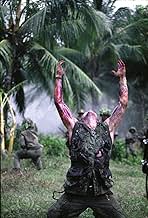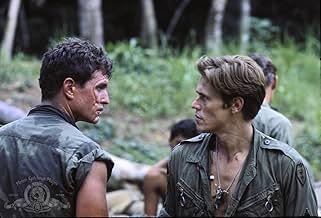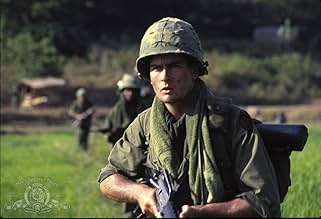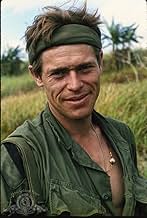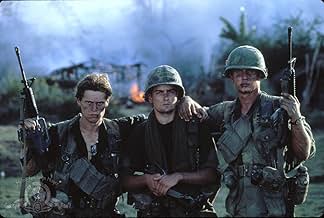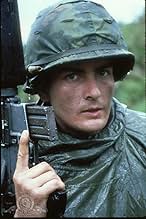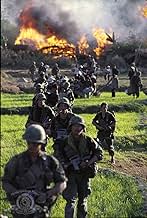Un jeune soldat au Vietnam traverse une crise morale lorsqu'il est confronté aux horreurs de la guerre et à la dualité de l'homme.Un jeune soldat au Vietnam traverse une crise morale lorsqu'il est confronté aux horreurs de la guerre et à la dualité de l'homme.Un jeune soldat au Vietnam traverse une crise morale lorsqu'il est confronté aux horreurs de la guerre et à la dualité de l'homme.
- A remporté 4 oscars
- 24 victoires et 16 nominations au total
Best Picture Winners by Year
Best Picture Winners by Year
See the complete list of Best Picture winners. For fun, use the "sort order" function to rank by IMDb rating and other criteria.
Histoire
Le saviez-vous
- AnecdotesAccording to Oliver Stone, he intentionally cast Tom Berenger and Willem Dafoe against type. Berenger was mostly famous for playing good guys, while Dafoe had primarily played villains up until then. Both men received Oscar nominations for their work.
- GaffesWhen the men are playing cards, one of the men is looking at a Playboy from March 1971, despite the film taking place in 1967.
- Citations
[Refering to Vietnam]
Chris Taylor: Somebody once wrote, "Hell is the impossibility of reason." That's what this place feels like. Hell. I hate it already, and it's only been a week. Some goddamn week.
- Autres versionsTV version has much of its dialogue redubbed and shots refilmed, replacing such lines as "He thinks he's Jesus F---in' Christ!" with "He thinks he's George Freakin' Washington!"
- ConnexionsEdited into A Tour of the Inferno: Revisiting 'Platoon' (2001)
- Bandes originalesAdagio for Strings
Written by Samuel Barber
Arranged and Conducted by Georges Delerue
Used by arrangement with G. Schirmer, Inc.
Commentaire en vedette
Ever since Steven Spielberg wowed the cinematic world and changed the aesthetic of the war movie forever with the exceptional opening 25 minutes of 1998's Saving Private Ryan - the film went downhill from there - audiences have come to expect the same grainy camera-work and ultra-realism of Spielberg's breathtaking vision whenever a battle is depicted. Anything else would be 'unrealistic', and many movies dated horribly almost overnight as a result. While Oliver Stone's Platoon, which was once considered difficult to watch due to its unflinching depiction of the insanity of war, may not seem quite as brutal as it used to, it possesses one thing that no war other movie can boast - the guiding hand of a veteran.
Stone did a tour in Vietnam which ended in 1968, changing the future writer/director forever. Starting out life as a screenplay focusing on a soldier's experiences both before and during the war which had Jim Morrison touted for the lead, it evolved into a movie focused solely on a young volunteer's time spent in the sweaty, eternally damp jungle. Charlie Sheen's Chris Taylor is an obvious stand-in for Stone, and he arrives fresh-faced and eager to fight for his country. By the end, he is dazed and confused, and angry at the country who would send such "bottom of the barrel" men - invisible in society - into a world of such horror and meaningless bloodshed. It's an experience that moulded Stone into the one of the most outspoken voices in cinema.
The casting of the two sergeants vying for Chris' soul is a stroke of genius. The platoon is made up of two main groups - the 'juicers', a collection of beer-swilling meat-heads seemingly intent on violence at every opportunity, and the 'heads', a more laid-back and weary bunch who are happiest when getting high and having a singalong. At the head of the juicers is Sgt. Barnes, played by Tom Berenger, an actor known for his heart-throb leading-man roles but here cast as a dead-eyed, heavily scarred brute. While Willem Dafoe, who was and still is known for his crazy-eyed villainous roles, plays the wiser, gentler leader of the heads, an all-round good guy battling his own demons. By toying with expectations, Stone adds layers to their characters, and they both received Best Actor nominations for their efforts.
Yet what makes Platoon truly stand out 30 years after its release is the way Stone manages to transport the audience to that terrible place. It's teeming with dangers at every turn, be it the ants, the snakes or the Viet Cong better equipped for the harsh surroundings, the most frightening moment is when they fall asleep. And even when they awake, there's something moving in the shadows. The film never allows you to ever be at ease, despite the fun to be had with spotting the many famous faces dotted throughout the supporting cast. There are flaws, especially with some overacting from some of the supporting cast - in particular John C. McGinley - and Chris' unnecessary, rambling narration, but the movie packs such a punch that it's easy to forget these quibbles. It's a true insight into the mind of a grunt and how combat can have a lasting, eye-opening effect on those on the ground, and undoubtedly one of the most important war pictures ever to come out of the US.
Stone did a tour in Vietnam which ended in 1968, changing the future writer/director forever. Starting out life as a screenplay focusing on a soldier's experiences both before and during the war which had Jim Morrison touted for the lead, it evolved into a movie focused solely on a young volunteer's time spent in the sweaty, eternally damp jungle. Charlie Sheen's Chris Taylor is an obvious stand-in for Stone, and he arrives fresh-faced and eager to fight for his country. By the end, he is dazed and confused, and angry at the country who would send such "bottom of the barrel" men - invisible in society - into a world of such horror and meaningless bloodshed. It's an experience that moulded Stone into the one of the most outspoken voices in cinema.
The casting of the two sergeants vying for Chris' soul is a stroke of genius. The platoon is made up of two main groups - the 'juicers', a collection of beer-swilling meat-heads seemingly intent on violence at every opportunity, and the 'heads', a more laid-back and weary bunch who are happiest when getting high and having a singalong. At the head of the juicers is Sgt. Barnes, played by Tom Berenger, an actor known for his heart-throb leading-man roles but here cast as a dead-eyed, heavily scarred brute. While Willem Dafoe, who was and still is known for his crazy-eyed villainous roles, plays the wiser, gentler leader of the heads, an all-round good guy battling his own demons. By toying with expectations, Stone adds layers to their characters, and they both received Best Actor nominations for their efforts.
Yet what makes Platoon truly stand out 30 years after its release is the way Stone manages to transport the audience to that terrible place. It's teeming with dangers at every turn, be it the ants, the snakes or the Viet Cong better equipped for the harsh surroundings, the most frightening moment is when they fall asleep. And even when they awake, there's something moving in the shadows. The film never allows you to ever be at ease, despite the fun to be had with spotting the many famous faces dotted throughout the supporting cast. There are flaws, especially with some overacting from some of the supporting cast - in particular John C. McGinley - and Chris' unnecessary, rambling narration, but the movie packs such a punch that it's easy to forget these quibbles. It's a true insight into the mind of a grunt and how combat can have a lasting, eye-opening effect on those on the ground, and undoubtedly one of the most important war pictures ever to come out of the US.
- tomgillespie2002
- 26 oct. 2016
- Lien permanent
Meilleurs choix
Connectez-vous pour évaluer et surveiller les recommandations personnalisées
Détails
Box-office
- Budget
- 6 000 000 $ US (estimation)
- Brut – États-Unis et Canada
- 138 530 565 $ US
- Fin de semaine d'ouverture – États-Unis et Canada
- 241 080 $ US
- 21 déc. 1986
- Brut – à l'échelle mondiale
- 138 545 632 $ US
- Durée2 heures
- Couleur
- Mixage
- Rapport de forme
- 1.85 : 1
Contribuer à cette page
Suggérer une modification ou ajouter du contenu manquant








